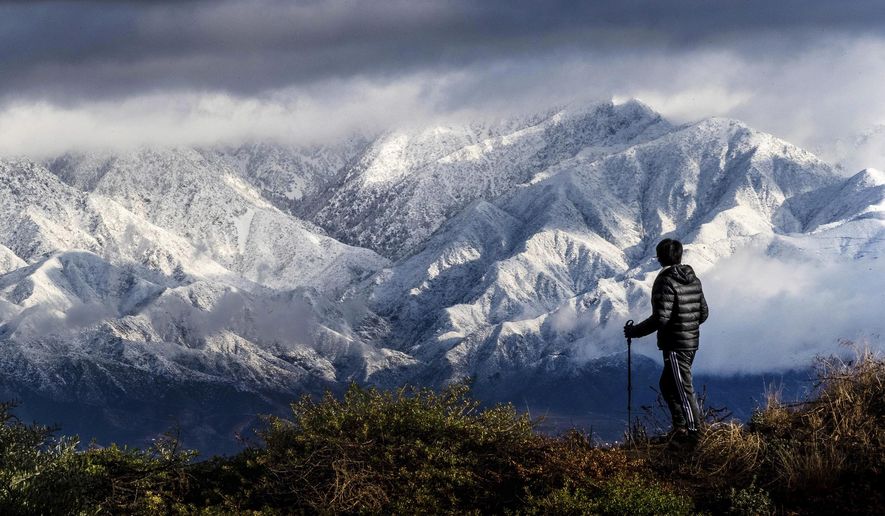
– Friday, February 26, 2021
The House voted Friday to cordon off nearly three million acres of Western land in the name of environmental protection, overriding Republicans who called it a “massive land grab” that will kill jobs, increase wildfire danger and reduce access to public lands.
The Protecting America’s Wilderness and Public Lands Act, approved by a vote of 227 to 200, combined eight Democrat-sponsored bills to create another 1.49 million aces of federal wilderness, including more than 1,000 river miles, and withdraw 1.2 million acres from new oil and mining claims.
The package affecting four states—Arizona, California, Colorado and Washington—will ensure that “iconic landscapes like the Grand Canyon and Colorado’s Thompson Divide are permanently protected from the irreversible threats posed by extraction,” said the House Natural Resources Committee.
“Protecting our environment is not a matter of choice or political preference,” said Rep. Raul Grijalva, who chairs the committee. “It’s the only path forward for our country and our way of life.”
The bill dovetails with President Biden’s so-called 30×30 pledge aimed at conserving 30% of U.S. land—an area twice the size of Texas—and 30% of coastal seas by 2030.
Included in the package was Mr. Grijalva’s Grand Canyon Protection Act, which bans future mining claims around the Grand Canyon National Park in Arizona without touching existing claims.
Sandy Bahr, director of the Sierra Club’s Grand Canyon chapter, called the bill “critical to ensuring that the lands, water, wildlife, and people of the region are protected from the harmful and toxic effects of uranium mining.”
The package passed over the opposition of Republicans who argued that the federal government already struggles to manage its vast acreage—nearly half of Western lands are federally owned—citing the National Park Service’s $12 billion maintenance backlog.
Rep. Tom McClintock, California Republican, said in a floor speech that the bill would declare an area the size of Delaware “a wilderness area, off limits to forest management, timber harvesting, and even many forms of public recreation.”
“An untended forest is like an untended garden,” Mr. McClintock said.” It will grow until it chokes itself to death and succumbs to disease, pestilence and ultimately catastrophic wildfire. These restrictions have abandoned our forests to neglect and produced the paradox of a severe national lumber shortage while the government sits on vast timber reserves.”
He warned that the restrictions would “create water shortages in some of the most water-abundant regions of our country.”
HR 803 is a disastrous federal lands package that will result in more dead forests, more water shortages, increasing costs for energy and consumer goods, lower wages, and fewer jobs. These policies always produce want from plenty. #DemLandLock pic.twitter.com/d2PycNCyxN
— Tom McClintock (@RepMcClintock) February 26, 2021
Democrats and Republicans were in agreement on one thing: The bill is big, “one of the largest land-protection packages Congress has ever considered,” said Rep. Diana DeGette, Colorado Democrat.
The bill permanently sets aside more than one million acres in Colorado; 821,000 acres in California; 132,000 acres in Washington, and more than one million acres in Arizona.
“Protecting our public lands shouldn’t be a partisan issue,” said Ms. DeGette. “For those of us who have been lucky enough to visit the lands that will be protected under this bill, we know how special they are.”
Rep. Doug Lamborn, Colorado Republican, countered the bill would be “the largest land grab in Colorado’s history,” exacerbating the risk of catastrophic wildfires by limiting the Forest Service’s flexibility.
“If this legislation were to become law, we would certainly face hotter, more widespread, and more dangerous fires,” Mr. Lamborn said.
Rep. Paul Gosar, Arizona Republican, said that the “massive land grab” would kill an estimated 4,000 jobs and cost $29 billion in sacrificed economic activity while leaving the nation even more dependent on Russia for uranium.
“The withdrawal area also contains 4,204 acres belonging to the Arizona State Land Department for the benefit of Arizona’s school children,” Mr. Gosar said. “This withdrawal will mean hundreds of millions of dollars in lost revenues for local communities and for our schools.”
The bill now goes to the Senate, which Democrats control by a slim 50-50 margin.
Original article from The Washington Times



More Stories
Diabetes Awareness is Important
Today’s News: March 26, 2024
The Greatest Purveyor of Violence In The World